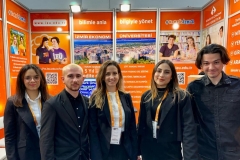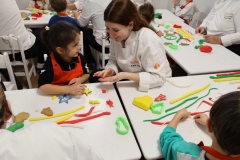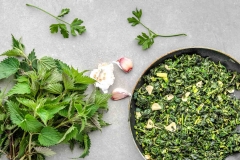
SCHOOL OF APPLIED MANAGEMENT SCIENCES
Gastronomy and Culinary Arts Program
CLM 305 | Course Introduction and Application Information
| Course Name |
Turkish Cuisine
|
|
Code
|
Semester
|
Theory
(hour/week) |
Application/Lab
(hour/week) |
Local Credits
|
ECTS
|
|
CLM 305
|
Fall
|
1
|
4
|
3
|
5
|
| Prerequisites |
None
|
|||||
| Course Language |
English
|
|||||
| Course Type |
Required
|
|||||
| Course Level |
First Cycle
|
|||||
| Mode of Delivery | - | |||||
| Teaching Methods and Techniques of the Course | Application: Experiment / Laboratory / WorkshopLecture / Presentation | |||||
| Course Coordinator | - | |||||
| Course Lecturer(s) | ||||||
| Assistant(s) | - | |||||
| Course Objectives | Preparing and presenting menus in the Turkish Cuisine in accordance with nutritional principles |
| Learning Outcomes |
The students who succeeded in this course;
|
| Course Description | This course includes the general structure of Turkish cuisine, the materials used in Turkish cuisine and the applications for developing food preparation skills with these ingredients. It aims the historical and cultural elements unique to Turkish Cuisine and the food presentation and organization compatible with these elements. |
|
|
Core Courses |
X
|
| Major Area Courses | ||
| Supportive Courses | ||
| Media and Management Skills Courses | ||
| Transferable Skill Courses |
WEEKLY SUBJECTS AND RELATED PREPARATION STUDIES
| Week | Subjects | Related Preparation |
| 1 | Introduction to Turkish cuisine Sanitation and personal hygiene Turkish cuisine equipment | Bilgin, A., Samancı, Ö., (Eds.). (2015). In Turkish Cuisine (2nd ed.). Ministry of Culture and Tourism. |
| 2 | Jams and Pickles / Application | Bilgin, A., Samancı, Ö., (Eds.). (2015). In Turkish Cuisine (2nd ed., pp. 373 – 376). Ministry of Culture and Tourism |
| 3 | Soups / Application | Bilgin, A., Samancı, Ö., (Eds.). (2015). In Turkish Cuisine (2nd ed., pp. 339 – 340). Ministry of Culture and Tourism. |
| 4 | Pilafs / Application | Bilgin, A., Samancı, Ö., (Eds.). (2015). In Turkish Cuisine (2nd ed., pp. 363 – 366). Ministry of Culture and Tourism. |
| 5 | Stuffed Food / Application | Bilgin, A., Samancı, Ö., (Eds.). (2015). In Turkish Cuisine (2nd ed., pp. 351 – 354). Ministry of Culture and Tourism. |
| 6 | Stews / Application | Bilgin, A., Samancı, Ö., (Eds.). (2015). In Turkish Cuisine (2nd ed., pp. 359 – 362). Ministry of Culture and Tourism. |
| 7 | Appetizers / Application | Bilgin, A., Samancı, Ö., (Eds.). (2015). In Turkish Cuisine (2nd ed., pp. 369 – 372). Ministry of Culture and Tourism. |
| 8 | Baking Goods / Application MIDTERM EXAM | Bilgin, A., Samancı, Ö., (Eds.). (2015). In Turkish Cuisine (2nd ed., pp. 355 – 358). Ministry of Culture and Tourism. |
| 9 | Pastry / Application | Bilgin, A., Samancı, Ö., (Eds.). (2015). In Turkish Cuisine (2nd ed., pp. 355 – 358). Ministry of Culture and Tourism. |
| 10 | Milky Desserts / Application | Bilgin, A., Samancı, Ö., (Eds.). (2015). In Turkish Cuisine (2nd ed., pp. 377 – 388). Ministry of Culture and Tourism. |
| 11 | Desserts with Syrup / Application | Bilgin, A., Samancı, Ö., (Eds.). (2015). In Turkish Cuisine (2nd ed., pp. 377 – 388). Ministry of Culture and Tourism. |
| 12 | Sherbets and Stewed Fruit (Compotes) / Application | Bilgin, A., Samancı, Ö., (Eds.). (2015). In Turkish Cuisine (2nd ed., pp. 389 – 392). Ministry of Culture and Tourism. |
| 13 | İzmir Cuisine-I / Application | Otlar - Sebzeler. (2018). In İzmir’in Lezzet Öyküsü (2nd ed.). İzmir Valiliği İl Kültür ve Turizm Müdürlüğü. |
| 14 | İzmir Cuisine-II / Application Project submission | Etler - Sakatatlar. (2018). In İzmir’in Lezzet Öyküsü (2nd ed.). İzmir Valiliği İl Kültür ve Turizm Müdürlüğü. |
| 15 | Review of the Semester | |
| 16 | Final Exam |
| Course Notes/Textbooks | Bilgin, A., Samancı, Ö., (Eds.). (2015). In Turkish Cuisine (2nd ed.). Ministry of Culture and Tourism. İzmir’in Lezzet Öyküsü (2018) 2. cilt, İzmir Valiliği İl Kültür ve Turizm Müdürlüğü, ISBN 978-975-17-41-11-0-1
|
| Suggested Readings/Materials | Şavkay, T. (2000), Osmanlı Mutfağı, Şekerbank, ISBN 979-974-447-00-16 Şavkay, T. (2000), Tatlı Kitap Türk ve Dünya Tatlıları, Şekerbank, ISBN 978-975-978-65-40
|
EVALUATION SYSTEM
| Semester Activities | Number | Weigthing |
| Participation | ||
| Laboratory / Application |
1
|
30
|
| Field Work | ||
| Quizzes / Studio Critiques | ||
| Portfolio | ||
| Homework / Assignments | ||
| Presentation / Jury | ||
| Project |
1
|
15
|
| Seminar / Workshop | ||
| Oral Exams | ||
| Midterm |
1
|
25
|
| Final Exam |
1
|
30
|
| Total |
| Weighting of Semester Activities on the Final Grade |
3
|
70
|
| Weighting of End-of-Semester Activities on the Final Grade |
1
|
30
|
| Total |
ECTS / WORKLOAD TABLE
| Semester Activities | Number | Duration (Hours) | Workload |
|---|---|---|---|
| Theoretical Course Hours (Including exam week: 16 x total hours) |
16
|
1
|
16
|
| Laboratory / Application Hours (Including exam week: '.16.' x total hours) |
16
|
4
|
64
|
| Study Hours Out of Class |
14
|
2
|
28
|
| Field Work |
0
|
||
| Quizzes / Studio Critiques |
0
|
||
| Portfolio |
0
|
||
| Homework / Assignments |
0
|
||
| Presentation / Jury |
0
|
||
| Project |
1
|
22
|
22
|
| Seminar / Workshop |
0
|
||
| Oral Exam |
0
|
||
| Midterms |
1
|
10
|
10
|
| Final Exam |
1
|
10
|
10
|
| Total |
150
|
COURSE LEARNING OUTCOMES AND PROGRAM QUALIFICATIONS RELATIONSHIP
|
#
|
Program Competencies/Outcomes |
* Contribution Level
|
||||
|
1
|
2
|
3
|
4
|
5
|
||
| 1 | Successfully applies theoretical and practical knowledge and skills in Gastronomy and Culinary Arts |
X | ||||
| 2 | Carries best practices in terms of work and food security, safety and hygiene in food production |
|||||
| 3 | Appreciates, evaluates and makes decisions regarding to visual, textual and nutritional data with respect to food production and presentation |
|||||
| 4 | Recognizes and evaluates the impact of gastronomy on culture and society |
X | ||||
| 5 | Assumes responsibility for solving complex problems that may occur in the field of Gastronomy and Culinary Arts, both individually and as a team member |
X | ||||
| 6 | Evaluates the knowledge and skills acquired in the field of Gastronomy and Culinary Arts with a critical approach and effectively communicate their ideas and suggestions for solutions in written and oral form. |
X | ||||
| 7 | Possesses necessary knowledge and skills in relevant fields such as gastronomy, design, law and management and effectively apply them to the practice of Culinary Arts |
|||||
| 8 | Uses the technological tools related to Gastronomy and Culinary Arts effectively |
|||||
| 9 | Updates and improve the knowledge, skills and competencies related to Gastronomy and Culinary Arts with lifelong learning awareness and sustainability with an ethical approach |
|||||
| 10 | Collects data in the areas of Gastronomy and Culinary Arts and communicate with colleagues in a foreign language. (European Language Portfolio Global Scale”, Level B1) |
|||||
| 11 | Speaks a second foreign at a medium level of fluency efficiently |
|||||
| 12 | Relates the knowledge gained through the history of humanity to the field of expertise |
|||||
*1 Lowest, 2 Low, 3 Average, 4 High, 5 Highest
NEWS |ALL NEWS
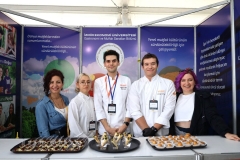
Aegean flavors from the chefs of the future
Izmir University of Economics (IUE) Department of Gastronomy and Culinary Arts left its mark on the 6th Izmir GastroFest, organized this year with
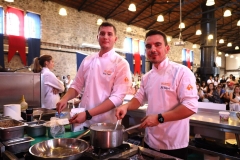
They added flavor to GURMEFEST
GURMEFEST, one of the biggest food, drink and entertainment festivals of Izmir, was ‘flavored’ with the dishes prepared and presented by the
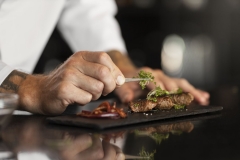
“Izmir and Bodrum will class up”
The MICHELIN Guide, one of the most prestigious restaurant rating systems in the world, has added Izmir and Bodrum to its Turkish
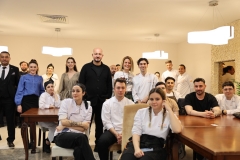
IUE graduates will prepare the flavors unique to Turkish cuisine
Bilsev Group, who is preparing to expand to Dubai this year with its Ferdi Baba, Fabrice Restaurant and Baba Pizza brands, will
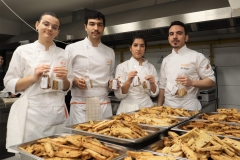
They prepared products that are filling and have a long shelf life
25 students of Department of Gastronomy and Culinary Arts of Izmir University of Economics (IUE) prepared products with a long shelf life,



